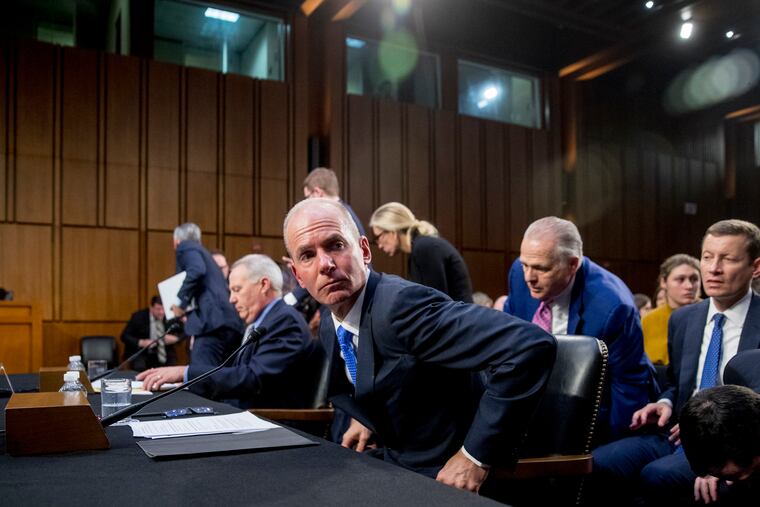Boeing chief at Senate 737 Max hearing: ‘We made mistakes’
Lawmakers from both parties offered withering criticism of Boeing on Tuesday, blasting the airplane manufacturer for rushing into production the model of 737 Max that was involved in two fatal accidents that killed 346 people.

WASHINGTON — Lawmakers from both parties leveled withering criticism of Boeing on Tuesday, blasting the airplane manufacturer for rushing into production the model of 737 Max that was involved in two fatal accidents that killed 346 people.
On the one-year anniversary of the crash of Lion Air Flight 610 off the coast of Indonesia, lawmakers on the Senate Commerce, Science and Transportation Committee questioned whether Boeing was too cozy with federal regulators, whether it held back key information from those regulators and the pilots who flew its aircraft. and whether its culture contributed to the production of an unsafe aircraft.
With people who lost loved ones in the crash sitting stoically in a row behind him, Boeing CEO Dennis Muilenburg apologized to the family members, telling them, “I think about you and your loved ones every day,” and vowing to do better.
“We’ve been challenged and changed by these accidents,” he said. “We’ve made mistakes and we’ve got some things wrong. We’re improving and we’re learning and we’re continuing to learn.”
It was Muilenburg’s first appearance before Congress since the two crashes. He did not turn around to face the survivors during the apology.
Senators were not soothed by his words.
‘Deliberate concealment’
“These loved ones lost lives because of an accident that was not only preventable but was the result of a pattern of deliberate concealment,” said Sen. Richard Blumenthal (D., Conn.), who said Boeing officials assured him privately after the accidents that they were the result of pilot error.
In fact, he said, they were in part the result of a lack of information about the aircraft’s new MCAS steering system, and he said Boeing kept information about it from those who needed it most.
Blumenthal displayed emails from a Boeing test pilot asking the Federal Aviation Administration to keep information about the system out of its flight manuals. He argued that lack of information directly contributed to the accidents.
“Those pilots never had a chance,” he said. “These loved ones never had a chance. They were in flying coffins as a result of Boeing’s decision that it was going to conceal MCAS from the pilot.”
Committee Chairman Roger Wicker (R., Miss.) questioned whether Boeing rushed the Max toward certification and took advantage of a process called “Organization Designation Authority” that allowed Boeing to certify parts of the aircraft for the FAA. In what would become a theme, he questioned whether regulators were too close with Boeing and whether that relationship ultimately contributed to the accidents.
“This hearing will by no means end our inquiry,” he said.
The Boeing 737 Max was grounded on March 13, three days after Ethiopian Airlines Flight 302 crashed, killing 157 people. The Lion Air crash killed 189. Boeing has told investors it hopes to have the aircraft returned to the air by the end of the year, though Muilenburg emphasized Tuesday he would do so only after regulators “have applied the most rigorous scrutiny and are completely satisfied as to the plane’s safety.”
Among those in the hearing room were Gladys Kivia of Calgary, Canada, who lost her husband, Derrick Lwugi, on Flight 302. Lwugi, a native of Kenya, was going to visit his sick mother when he was killed. He left behind a widow who spent parts of the hearing huddled over, crying silently, and three children.
“People can’t just die like that and nothing happens to make it safe,” she said before the hearing. “If someone did something after Lion Air, maybe Derrick and the other people would not have died."
Sen. Tom Udall (D., N.M.), meanwhile, expressed frustration that the company has not yet embraced legislative fixes that would prevent future accidents.
In his testimony, Muilenburg said the company has made internal fixes including convening an aerospace safety committee on the board of directors, establishing a product and services safety organization to review aspects of product safety and provide reporting and elevation of safety concerns, and strengthening its engineering organization.
But Udall wanted to know about legislative fixes Muilenburg would back.
“What is it you’re going to commit to specifically in terms of reform?” Udall asked. “That’s why you’re up here. That’s what we want to see you to do is to weigh in with us.”
Other lawmakers made it clear that despite more than 100,000 engineering and test hours spent improving the Max after the crashes, they weren’t comfortable with the aircraft flying again.
“I would walk before I would go on a 737 Max,” said Sen. Jon Tester (D., Mont.).